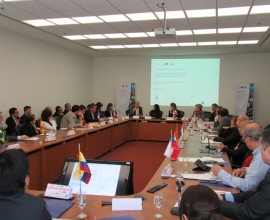Representatives from Latin America and Europe meet to share their expertise on young people in conflict with the law in Latin America
‘1st Regional Seminar on Juvenile Justice’, held from the 30th of November to the 2nd of December in Mexico City
Deputy Ministers, Secretaries-General and Managing Directors from juvenile justice institutions from 11 Latin American countries have taken part together with their European counterparts, representatives from the European Union and international organisations, in the ‘1st Regional Seminar on Juvenile Justice’, held from the 30th of November to the 2nd of December in Mexico City.
The meeting was co-organised by the International Juvenile Justice Observatory (IJJO), Expertise France and the Technical Secretariat of the Coordination Council for the Implementation of the Penal Justice System of Mexico, and is part of the EUROsociAL II Programme which is financed by the European Union.
The participants exchanged effective responses to the new challenges presented by violence and crime involving children and young people, together tackling the regional situation of young people in conflict with the law. Representatives from Mexico, Brazil, Bolivia, Colombia, Chile, Costa Rica, Ecuador, Panama, Paraguay, Peru, and Uruguay took part in the event.
As a result of the technical cooperation which the IJJO has been developing in the region for more than a decade, a Regional Model of Juvenile Justice Policy has been created, and it has been introduced and discussed at the Regional Seminar. The creation of the Model was coordinated by the IJJO and carried out by Osvaldo Vázquez and Miguel Cillero, renowned experts in the region and the field of work. In addition, the team of experts has had the fundamental support of expert editors, Carlos Tiffer and Karyna Sposato. Together they form a team which is highly knowledgeable about the issues in the region.
This Model aims to be a very practical operative tool for those designing policies, programmes, plans and strategies for the administration of juvenile justice. The Model establishes a framework of general factors to take into account before devising a juvenile justice policy. The Model subsequently deals with essential aspects in the construction of the policy, as well as the essential components or areas such as the legal and institutional dimension.
The ‘1st Regional Seminar on Juvenile Justice’ was organised as part of the EUROsociAL II Programme. This programme is financed by the European Union and aims to promote and improve social cohesion in Latin America. The participants of the Regional Seminar have recognised the advances and efforts made by the Latin American States in the creation of juvenile justice policies. However, there are still many challenges to face in order to guarantee the protection of rights and the specialisation of systems and institutions.
The IJJO has given technical assistance to countries in the region, for example to Mexico, in the design of the National Adolescent Justice Law; to Costa Rica, in the design of the Public Policy on Restorative Juvenile Justice; to Colombia, in the design and implementation of the Public Policy on Crime Prevention in Adolescents and Young People; and to Chile in the creation of its National Service for the Social Reintegration of Adolescents, among other examples.
Nevertheless, juvenile justice systems in the region need to be improved and modernised by: advancing alternative measures for dispute resolution, exchanging promising experiences of restorative juvenile justice, promoting a regional dimension of the issue and fostering the bi-regional twinning of Latin American bodies and their European counterparts through dialogue and the sharing of responses.
OIJJ

